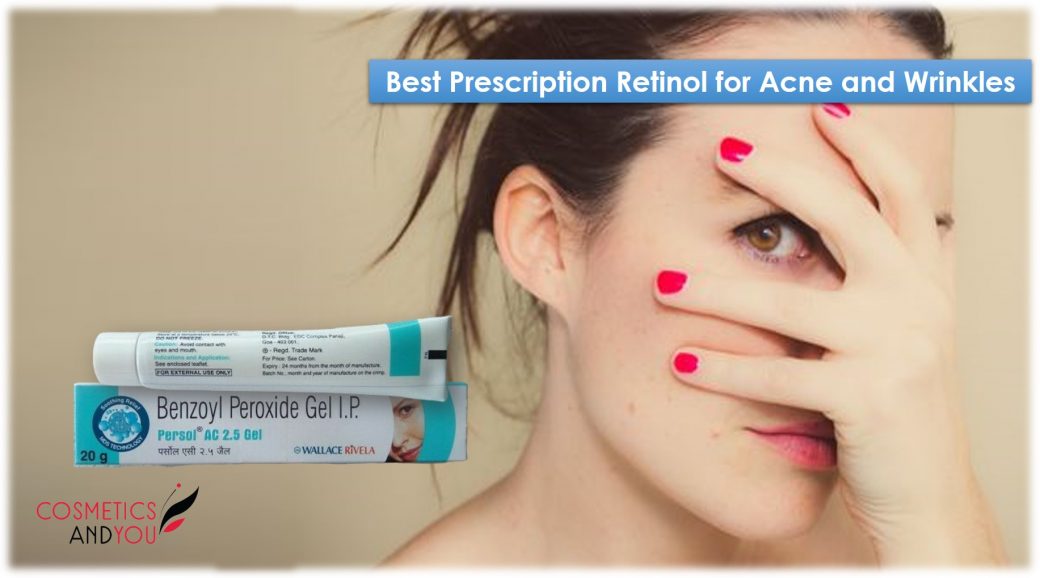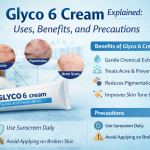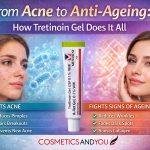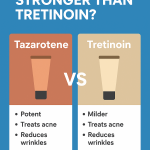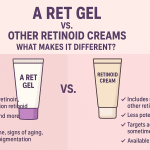Although Tretinoin was originally formulated to treat acne, several studies suggest it can also help to reduce the appearance of fine lines around the eyes and crease lines around the mouth.
Tretinoin- An effective Acne Remedy for Wrinkles and Skin Ageing
Used by millions of people worldwide, tretinoin has been primarily used for the early stages of acne because of its proven and tested properties that help inhibit the formation of microcomedones. No doubt, Tretinoin is one of the most effective solutions available in the market for treating and preventing acne. You can also think of this topical retinoid as acting like an anti-wrinkle agent. Research studies found a significant reduction in fine lines and wrinkles on the face.
Historically, tretinoin has been used to treat mild to moderate acne. Used as a monotherapy or in combination with antibacterials, its ability to speed up skin cell turnover and reduce the appearance of acne is well proven. However, over the years, there has been growing awareness within the experts’ community that Tretinoin also possesses anti-ageing benefits, which could be extremely beneficial for future skincare.
Tretinoin belongs to the retinoid family, which is the most studied retinoid. Researchers tested the effects of Tretinoin, and they found increased collagen production and a reduction in the appearance of fine lines and wrinkles. Numerous scientific studies have proven the efficacy of tretinoin as a potent anti-acne and anti-wrinkle agent. Let’s take a close look at the endless benefits of this topical retinoid.
Tretinoin for Acne
When it comes to skincare, a slew of products, including creams, lotions, and gels, exist that all promise to treat those popping pimples. Nowadays, anti-acne creams and gels containing Tretinoin are gaining popularity for a good reason. If you are dealing with rosacea and are looking to try your luck on treatment options, tretinoin may be the answer. This medication in the topical form is known to do wonders for the skin, providing brighter and more even skin tone. Read on to discover more about Tretinoin and its usage. Being a retinoid, tretinoin affects the growth of skin cells. By stimulating collagen production in the skin, it strengthens the structural level of the skin, which gives you a youthful and glowing skin. To get the most out of skincare products like Tretinoin cream, one needs to follow the instructions on how to use them correctly. With this topical acne treatment, patients should always apply the cream or gel before bed instead of during the day. Also, patients must never mix their retinoid formulation with other topical medicines or cosmetics that contain glycolic acid or benzoyl peroxide. Users must wait for 15 to 30 minutes after washing their face to apply the Tretinoin. During the initial weeks of treatment, you may notice an increase in acne as the medication works on pimples and your body adjusts to it. Users should start noticing improvement in the appearance of their acne within 8 to 12 weeks after starting the retinoid treatment. It is important to continue using the medications to see the best results.
Tretinoin for Wrinkles
Are you concerned about those fine lines on your face? From those crease lines on your forehead to your cheeks, facial wrinkles can develop in a variety of locations. You might develop wrinkles in your mid-20s, with wrinkles becoming more visible in the 30s and 40s. Every individual is different, but it is normal to develop some levels of facial wrinkles as you age. You develop wrinkles because your skin starts to become thinner, drier and loses elasticity. Decreased collagen production often leads to wrinkles. Tretinoin, initially used as an acne treatment, was later found also to fade dark spots, fine lines, and wrinkles. Retinoids reduce the appearance of wrinkled skin by increasing the production of collagen produced by your skin and speeding up the skin cell turnover, meaning your body replaces old skin cells with new skin cells at a frequent pace. Retinoid formulations also stimulate the production of new blood vessels in the skin, which improves the skin’s complexion. Additional benefits of the topical treatments include softening of rough patches and fading of acne scars or dark spots. It takes 3 to 6 months to see a significant reduction in the appearance of wrinkles, and maximum results will be seen after using the anti-ageing formulation for 6 to 12 months.
Because retinoids can cause skin dryness, dermatologists often recommend using them on an alternate day and gradually increasing the application as your skin adjusts to the medicine. Make sure you wear sunscreen whenever you step out in the sun because retinoids increase your skin’s sensitivity to sunlight. Retinoid preparations must be used continually to maintain the desired effects. These may not completely remove the wrinkles, but do improve the appearance of photoaged skin.

